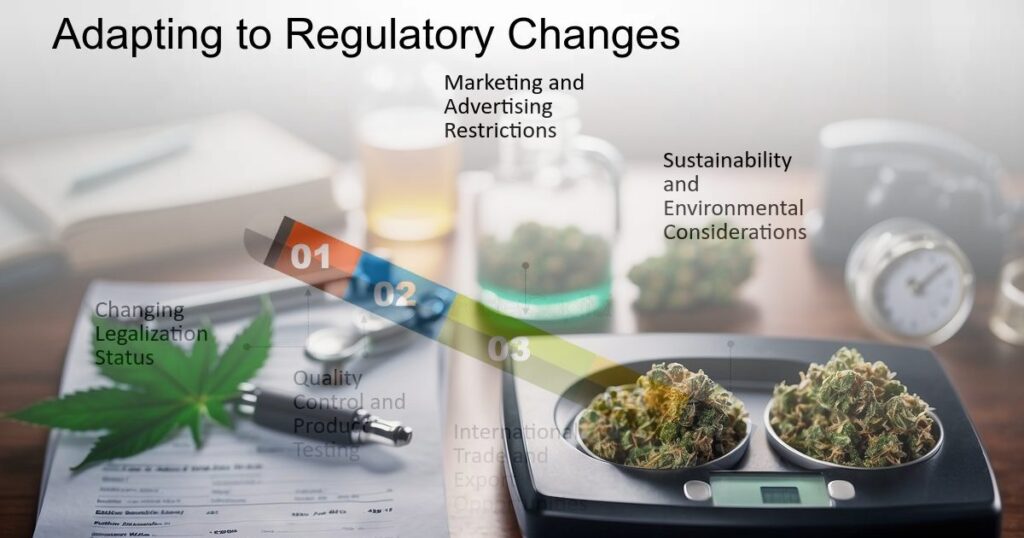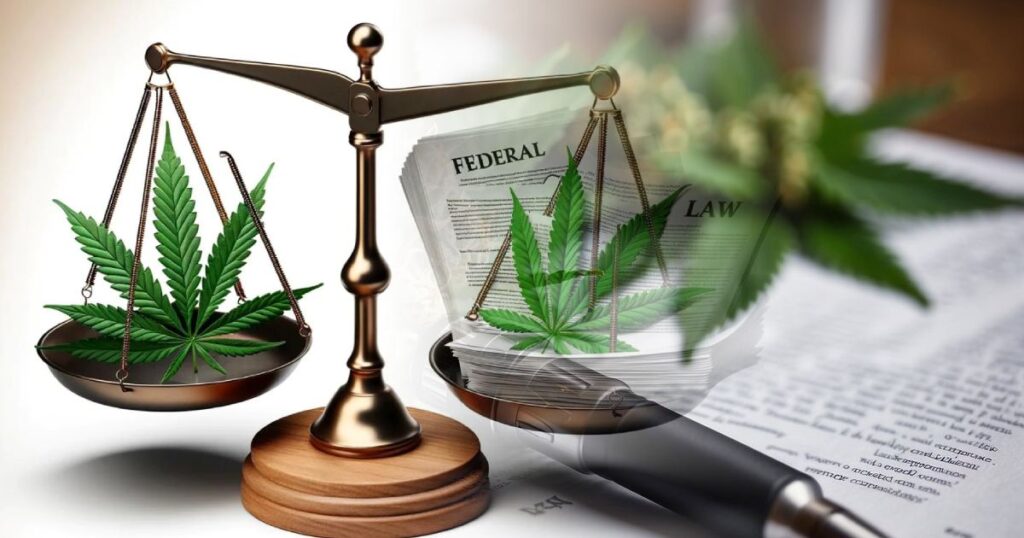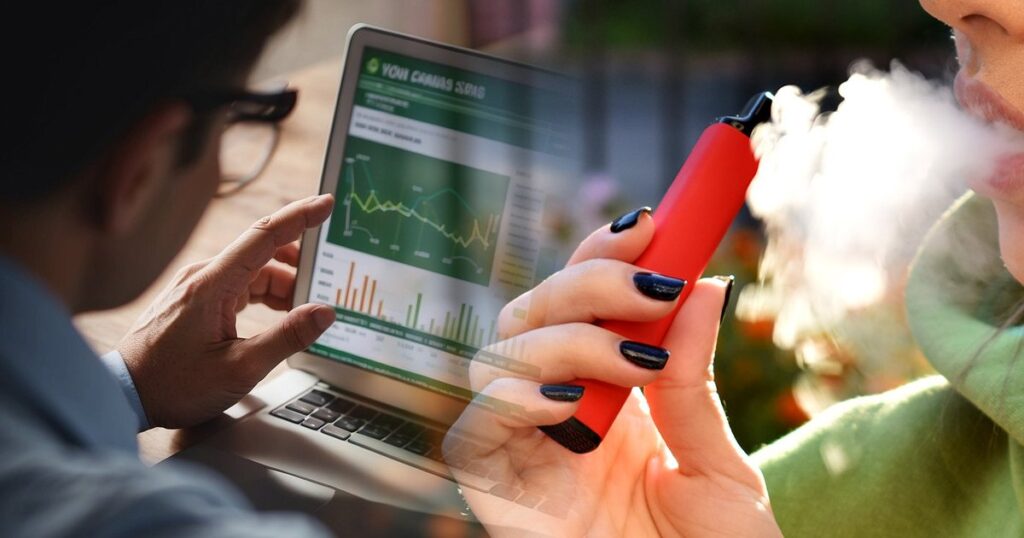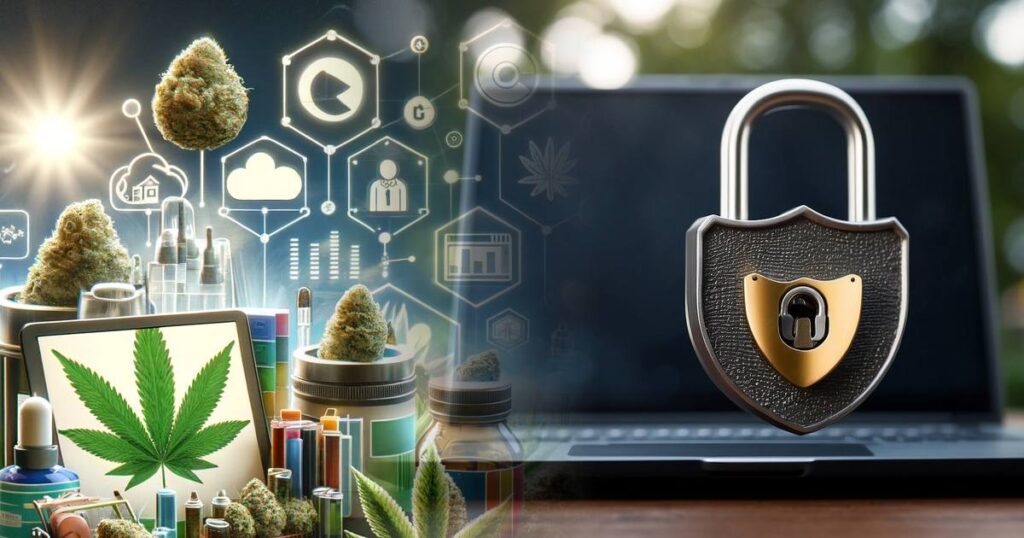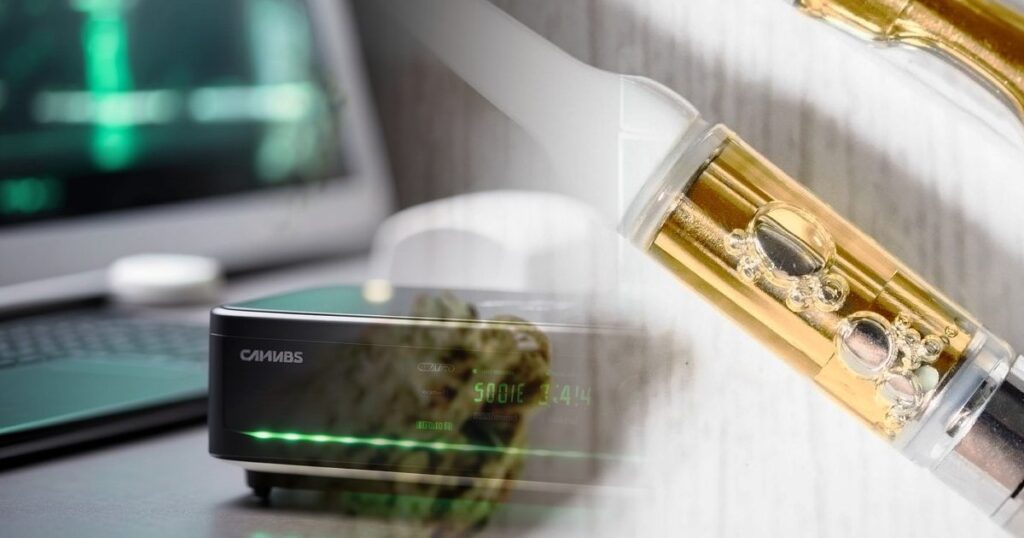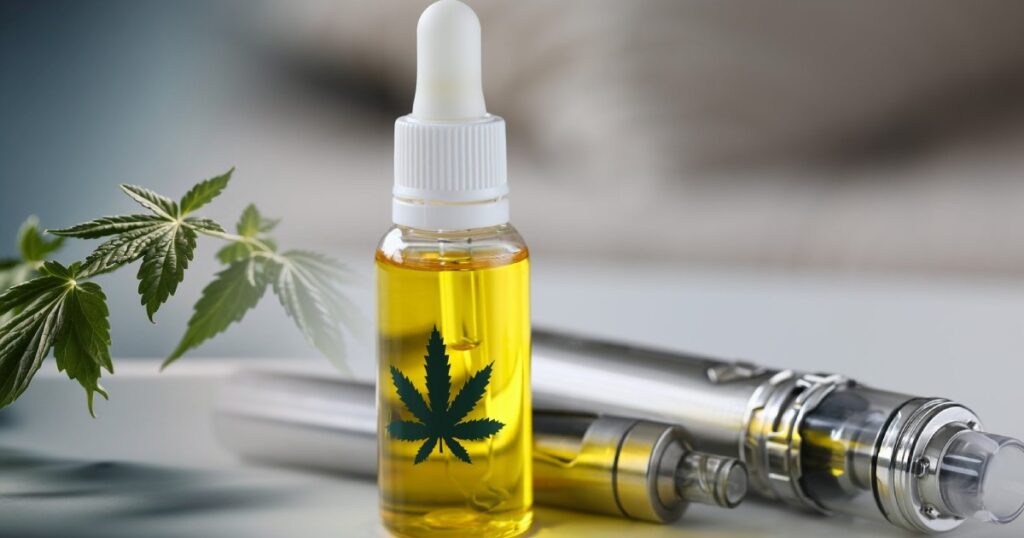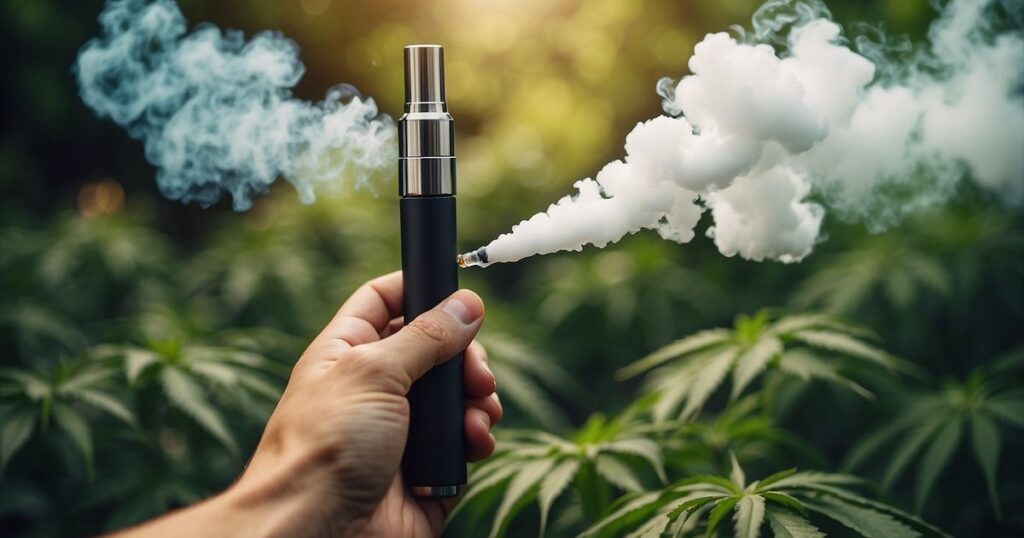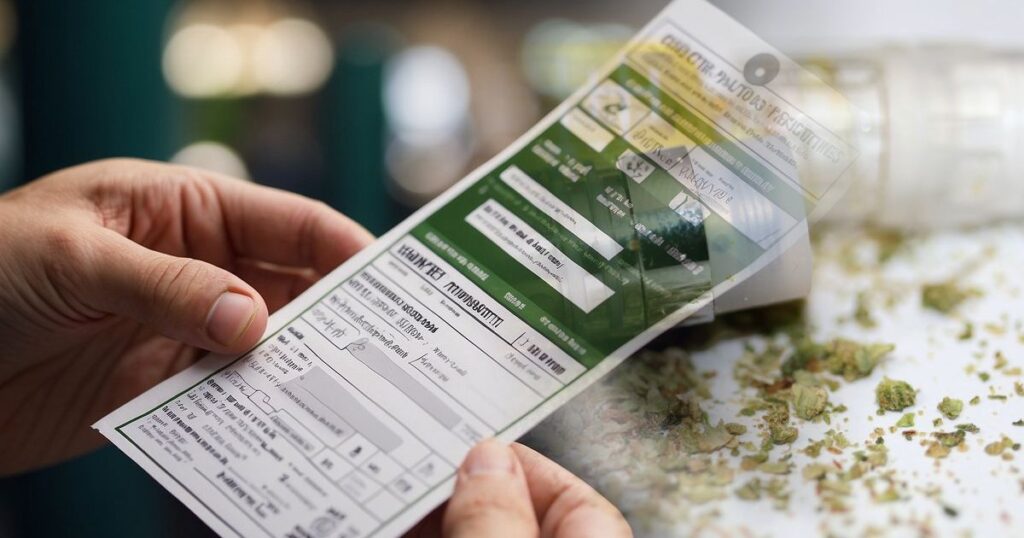Legal Considerations for Cannabis Vape Sellers: Navigating Regulatory Compliance
Legal Considerations for Cannabis Vape Sellers: Navigating Regulatory Compliance
Navigating the legal landscape for selling cannabis vape products is complex and demands a thorough understanding of both federal and state laws. In the United States, the cannabis industry is undergoing continuous change, with varied regulations across different jurisdictions. As a cannabis vape seller, you must actively remain vigilant and compliant with the legal frameworks that govern the sale of these products. It’s also crucial to be well-versed in the state-specific regulations where you operate, as the legality of THC vape cartridges and devices differs widely from state to state.
In addition to understanding the regulatory environment, you must also ensure the safety and quality of your cannabis vape products. This includes adhering to rigorous product testing standards and transparent marketing practices. Furthermore, accurate labeling and avoiding unsubstantiated health claims are key to maintaining consumer trust and avoiding legal scrutiny. By prioritizing product safety and quality like YPSILOS products, you align your business with best practices supporting longevity in a rapidly expanding market.
Key Takeaways
- Remain up-to-date on the evolving state-specific cannabis regulations.
- Make sure you thoroughly test your cannabis vape products for safety and quality.
- Adhere to clear and honest marketing standards to maintain trust and compliance.
Regulatory Landscape for Cannabis Vape Products
The regulatory environment for cannabis vape products is complex. Also, it varies by jurisdiction, requiring careful attention to state and federal laws and compliance with licensing and business operating prerequisites.
State Compliance and Legal Variances
As a seller of cannabis vape products, you need to be aware that state regulations differ significantly. For instance, states like California and Colorado have established legal frameworks supporting the sale of these products, while others, such as Georgia and Mississippi, remain more restrictive. Important legal variances to monitor include emergency bans affecting product availability and the requirement to adhere to local licensing requirements, permits, and excise tax structures. Keeping abreast of each state’s regulatory changes is vital for your business to remain in good standing.
Federal Regulations and Legal Challenges
At the federal level, your cannabis vape products fall under the scrutiny of several agencies, including the FDA, DEA, and CDC. Federal regulations require compliance with acts such as the Prevent All Cigarette Trafficking (PACT) Act and the Jenkins Act, especially since vape products could be considered Electronic Nicotine Delivery Systems (ENDS), even when they do not contain nicotine. You must meet reporting requirements and navigate the overarching United States legal landscape diligently.
Licensing and Business Operating Requirements
Your business must secure appropriate licensing and understand variant fees and taxes for operation. Each state may have a different license process and require diverse criteria to maintain regulatory compliance. You must stay current on the legal landscape within states like Massachusetts, Oregon, Alaska, Arizona, Illinois, Maine, Michigan, Montana, and any other state where you intend to operate. Ensure you’re meeting business operations standards, which include accurate reporting, ethical marketing, and adherence to all state-specific cannabis product regulations.
Product Safety, Quality, and Marketing Standards
As a cannabis vape seller, upholding the highest product safety and quality is essential, and adhering to marketing regulations is not only good practice but a legal necessity.
Ensuring Product Quality and Consumer Safety
Product Testing: Ensuring rigorous testing for potency, purity, and the absence of harmful substances in your THC vape cartridges is critical. This means checking for heavy metals, residual solvents, pesticides, and other contaminants. Choose a reputable manufacturer and use state-licensed testing facilities to verify that products meet all safety standards.
Protecting Consumers: Maintain a transparent relationship with your consumers by providing clear information on the concentration and potency of THC, CBD, and any other cannabinoids in your vape products. Be proactive in addressing potential safety concerns and ensure all products, including vape pens and vaporizers, meet the necessary safety certifications.
Labeling, Marketing, and Sales Compliance
Compliance with Regulations: Familiarize yourself with the FDA regulations for cannabis-derived products, including marketing and sales restrictions. Label products accurately, including any necessary health warnings, to comply with these standards.
Age Verification and Advertising: Implement strict age verification processes, both online and in-store, to ensure you only sell to customers of legal age. Ensure that all advertising and labeling is truthful and does not target underage individuals. This includes precise product labeling and responsible packaging to prevent misuse.
Frequently Asked Questions
In navigating the complex landscape of cannabis vape sales, you must understand the specific legal obligations and regulations that apply to your business. These frequently asked questions will guide you through some essential legal considerations.
What specific state regulations must cannabis vape sellers in California adhere to?
In California, cannabis vape sellers must comply with the Medicinal and Adult-Use Cannabis Regulation and Safety Act (MAUCRSA). This includes requirements for child-resistant packaging, strict labeling with detailed health warnings, and potency limits. Ensure you’re also familiar with local municipal codes that may impose additional restrictions.
How do cannabis vape sellers navigate federal and state legal discrepancies in the USA?
Cannabis vape sellers must operate within their state’s regulations while being aware of the federal Controlled Substances Act, under which cannabis is still considered illegal. This includes understanding how to manage banking, advertising, and interstate commerce governed by federal laws. Maintain compliance with your state’s laws and seek legal counsel to navigate federal discrepancies.
What are the packaging and labeling requirements for cannabis vape products?
Packaging for cannabis vape products must be child-resistant and sometimes tamper-evident. Labeling must include specific information such as the product’s ingredients, THC content, health warnings, and whether the product contains nicotine or cannabis. Labels should not make any false or misleading health claims.
What licenses does one need to operate a cannabis vaporizer business?
To operate a cannabis vaporizer business, you must obtain a state-specific license, which may vary from one state to another. Businesses must obtain separate licenses for retail, manufacturing, cultivation, and distribution in many places. Always check with your state’s cannabis regulatory authority to ensure you have the correct licensing.
How do laws differ for the sale of psychoactive compounds like Delta 8 THC in various states?
The legality of Delta 8 THC can vary greatly by state. Some states have explicitly legalized it, others have banned it, and a few remain unclear. It’s important to review your state’s Controlled Substances Act and consult with legal counsel to ensure compliance.
What privacy considerations should cannabis vape sellers keep in mind regarding customer purchases?
As a cannabis vape seller, you must actively protect your customers’ privacy. This includes securing any personal information and transaction records. Adhere to state privacy laws and, if applicable, the General Data Protection Regulation (GDPR) for any online sales involving European Union residents.
Legal Considerations for Cannabis Vape Users: Navigating Regulations and Compliance
Legal Considerations for Cannabis Vape Users: Navigating Regulations and Compliance
As cannabis legislation evolves, vape users must navigate a complex legal landscape. If you engage in cannabis vaping, it’s crucial to understand the specific regulations that pertain to both the recreational and medicinal use of cannabis in your location. The legality of cannabis vaping depends on whether your state has authorized its use and also the specific rules surrounding the product types, age restrictions, purchase limits, and consumption areas.
When using cannabis vapes, the quality and safety of the product are paramount. Furthermore, states with legal markets have established testing requirements for contaminants, potency, and legitimacy, but risks still exist, particularly with products from unregulated sources. Also, ensuring your vape products comply with state regulations can mitigate health risks associated with contaminants and improper labeling.
Key Takeaways
- The legalization of cannabis varies by state, affecting vape usage.
- Regulatory authorities subject state-regulated products to safety and potency tests.
- Compliance with state-specific cannabis vape regulations is mandatory.
Legal Landscape of Cannabis Vaping
Before exploring the distinct layers of legislation concerning cannabis vaping, you need to understand the nuances of regulation at both the federal and state levels and how they govern the legality, access, and compliance of cannabis vape products.
Overview of Federal and State Regulations
At the federal level, cannabis remains classified as a Schedule I drug under the Controlled Substances Act, making it illegal from the standpoint of the federal government. However, individual states have established their regulations for cannabis use, both medical and recreational. For example, California and Colorado are among the states with comprehensive legal frameworks allowing for the use of cannabis, including vape products, with specific state regulations for operation and sales.
- Federal Law: Illegal under Federal Law.
- State Regulations: Varies by state, legal in some for both recreational and medical use.
Legalization and Restrictions
The legalization of cannabis within various states includes provisions for both recreational marijuana and medical marijuana. While states like California and Colorado have progressive laws, usage is limited to individuals over a certain age, typically 21. It’s your responsibility to be aware of your state’s laws concerning:
- Recreational Marijuana: Legal in some states, 21+ for use.
- Medical Marijuana: Legal with varying restrictions; medical card required.
Moreover, where legalization has occurred, there are often strict restrictions and compliance measures concerning the production, testing, and sale of vape products, ensuring the safety and efficacy of these legal products within the regulated market.
Compliance and Enforcement
For the cannabis vaping industry to operate legally, entities must be licensed and remain compliant with state regulations, including security measures, testing protocols for potency and contaminants, and abiding by packaging and labeling laws. As a user, purchasing from licensed, compliant businesses is crucial to ensure you’re consuming legal products. Further, various state agencies carry out Enforcement of these regulations, and increasingly, there’s a collaboration with entities like the FDA to oversee product safety.
- Licensed Operations: Must adhere to state regulations.
- Testing and Compliance: Required for quality control and public safety.
- Enforcement: Conducted by state agencies, with potential federal collaboration.
Health and Safety Considerations
As cannabis vaping continues to gain popularity, understanding the health and safety implications, alongside the regulatory environment, is crucial for making informed decisions.
Vaping vs. Smoking: Health Impacts
Vaping cannabis is often perceived as a safer alternative to smoking because it avoids the combustion of plant material, which can release harmful carcinogens. However, research has shown that both vaping and smoking cannabis deliver THC—the psychoactive component of cannabis—and other compounds to your body that could affect your lung health. Researchers are still studying the long-term health impacts of vaping compared to smoking, but evidence suggests that vaping can reduce some of the respiratory symptoms associated with traditional smoking.
Potential Risks and Product Safety
When you use THC vape products, it’s essential to be aware of the potential risks:
- Lung Injuries: While vaping may minimize exposure to some toxins found in smoked cannabis, cases of e-cigarette or vaping-associated lung injuries (EVALI) highlight the importance of product safety.
- Dangerous Contaminants: Illegally manufactured vape products may contain harmful additives or contaminants, such as vitamin E acetate, strongly linked to EVALI.
- Cutting Agents: Some THC vape cartridges might contain cutting agents or other substances that can pose health risks when inhaled.
To mitigate these risks, you should exclusively use legal, regulated products that have undergone testing for contaminants and potency.
Regulations on Cannabis Vape Products
The legal landscape of cannabis vaping varies by jurisdiction, but there are common safeguards that legal markets enforce to protect consumers:
- Age Restrictions: Selling cannabis products to children and young adults is illegal, primarily due to potential impacts on brain development.
- Product Testing: Legal cannabis vape cartridges are subject to testing for THC potency, residual solvents, and contaminants.
- Certification: Products in regulated markets often require certification to confirm safety standards.
- Restrictions on Additives: Many regions restrict certain additives and require transparent labeling of all contents in vape cartridges.
As a cannabis vape user, you should inform yourself about the specific regulations in your area, which aim to ensure the safety and efficacy of cannabis vape products. Only purchase from reputable sources to avoid the risks associated with untested and potentially counterfeit products.
Frequently Asked Questions
Navigating the legal landscape of cannabis vaping can be challenging. Below are specific FAQs to help you understand the legal considerations.
What are the legal age restrictions for purchasing cannabis vape products?
You must be at least 21 years old to purchase cannabis vape products in states where recreational use is legal. The age can be 18 for medical use with a qualifying condition and proper documentation.
How do state laws vary regarding the possession and use of cannabis vapes?
State laws can differ significantly: some states allow both medical and recreational use of cannabis vapes, while others may only permit medical use or ban them altogether. Also, checking your state’s specific regulations is essential.
What are the potential legal consequences of vaping cannabis in public spaces?
Vaping cannabis in public can lead to legal consequences, including fines and possible arrest, depending on the state and local laws governing public consumption.
Can employers restrict the use of cannabis vape products by their employees?
Yes, employers can enforce workplace policies that restrict the use of cannabis vape products by their employees, even in states where use is legal.
Are there any specific licensing requirements for retailers selling cannabis vaping devices and products?
Retailers selling cannabis vaping devices and products must comply with state licensing requirements, which include stringent regulations to operate legally.
How have legal regulations for cannabis vape products changed in recent years?
Regulations for cannabis vape products have been in flux, with states reevaluating policies around the safety, packaging, and sale due to health concerns and advancements in product technology.
Impact of Legislation on the Cannabis Industry: Regulatory Changes and Business Adaptation
Impact of Legislation on the Cannabis Industry: Regulatory Changes and Business Adaptation
The cannabis industry is continuously evolving as legislation changes, dramatically impacting how the market operates. As you may be aware, the interplay between state laws and the federal legal framework in the United States has created a complex landscape for businesses involved in cannabis production and distribution. While some states have adopted laws permitting the use of medical and recreational cannabis, federal legislation has lagged, creating a patchwork of regulations affecting everything from business licenses to banking.
However, recent movements on the legislative front suggest potential shifts that may further influence the cannabis industry. Consider how legislative proposals could redefine the regulatory environment and potentially harmonize some of the disparities between state and federal laws. Moreover, understanding these potential changes is crucial for stakeholders looking to navigate the market and mitigate risk in the context of evolving policies.
Key Takeaways
- Legislation significantly influences the cannabis industry’s operations and growth potential.
- Aligning state and federal cannabis laws poses opportunities and challenges for market players.
- Staying informed about legislative changes is critical for navigating the cannabis industry successfully.
Legislative Developments and Their Effects
In this section, you’ll explore the intricate tapestry of cannabis legislation and its profound impact on the cannabis industry. From the pioneering ballot measures of California to the Controlled Substances Act at the federal level, understand how these laws shape everything from your local dispensary to international policy debates.
History and Evolution of Cannabis Laws
Through the years, your understanding of the legislative landscape for cannabis has expanded significantly. Initially, federal legislation such as the Controlled Substances Act classified marijuana as a Schedule I drug, placing stringent restrictions on its use, distribution, and research. However, states like California and Oregon pioneered the movement toward legalization through ballot measures, setting the stage for a wave of legislative changes across the United States.
State vs. Federal Perspectives
While many states have enacted laws to decriminalize cannabis and legalize its medical and recreational use, these state statutes often conflict with federal law. The tension between state legislatures and the federal government underscores a complex dynamic where businesses and consumers must navigate a patchwork of regulations that impact the cannabis industry’s growth and accessibility.
Impact on Medical and Recreational Use
The legislation significantly impacts both medical and recreational cannabis. States like Oklahoma, Ohio, and Connecticut have expanded legal medical cannabis programs, enhancing patient access to crucial treatments. Maryland, Delaware, and others have followed suit by legislating recreational cannabis use, which transformed public health perspectives and bolstered economic opportunities within the industry.
International Observations
Globally, countries like the Netherlands have long been models for decriminalization policies. However, recent policy changes in European countries reflect a shifting attitude towards the cannabis industry. These international developments influence domestic policy discussions, with lawmakers considering how a global perspective can inform the local impact of legislation on the cannabis industry.
Industry Dynamics and Market Implications
The legislation landscape profoundly influences your experience in the cannabis industry, from market growth to compliance costs.
Economic and Business Impacts
Regulatory changes have paved the way for new revenue and job creation in the cannabis industry. Taxation and licensing fees contribute to state budgets, while businesses face competition and financial challenges like limited banking services due to federal restrictions. Access to loans and cash management is complex, but recent talks suggest potential relief through legislation like the SAFE Banking Act.
- Increased Revenue: New legal markets and expanding existing ones have led to revenue growth.
- Job Creation: Licensing cultivators, retail dispensaries, and cannabis retailers creates jobs and stimulates local economies.
Regulations on Cultivation and Distribution
State regulations tightly control your cultivation and distribution activities. These regulatory regimes ensure product safety but can also restrict operational efficiency. Enforcement of such rules is essential to prevent oversupply and combat the illicit market, sustaining public safety.
- Cultivation Limits: Regulations often set plant count or canopy size limits, influencing market supply.
- Distribution Licenses: Required for legal distribution, impacting market entry and sales.
Public Health and Safety Considerations
The impact of legislation on public health is significant. Measures aim to prevent youth cannabis use and manage cannabis use disorder. Research into cannabis’s medicinal uses expands, yet treatment admissions for abuse remain a concern. Legislation must balance public health needs with industry growth.
- Restrictions: Authorities often restrict potent products and closely monitor advertising.
- Education: Campaigns funded by tax dollars to inform about safe usage and risks.
Advancements and Barriers
Stringent regulations often hamper progress in tech, marketing, and advertising. While individuals attempt to provide accurate information and promote responsible use, restrictions on cannabis advertising limit your ability to market products. Meanwhile, small businesses face fierce competition from larger entities that can better navigate complex legal landscapes.
- Technological Integration: From seed-to-sale tracking to e-commerce platforms.
- Marketing Limits: Tight controls on how and where cannabis can be promoted to maintain public safety.
Frequently Asked Questions
Understanding the impact of legislation on the cannabis industry is vital to comprehending its growing complexities and evolving marketplace. You’ll discover insights into the industry’s most pressing legal questions here.
How has recent federal legislation affected the cannabis industry?
You may have noticed shifts in the cannabis industry due to changes in federal legislation. These legal adjustments have perpetuated a flux in business operations on a day-to-day level, introducing both opportunities for growth and challenges in compliance for businesses navigating the federal-state law divide.
What are the economic consequences of legalizing cannabis?
Legalizing cannabis has created jobs and significant tax revenue for states that have adopted legalization measures. However, due to the existing federal prohibitions, cannabis businesses often encounter hurdles in banking, which can stymie economic growth.
In what ways does cannabis legislation influence crime rates in states like California and Colorado?
Your curiosity about crime rates in states like California and Colorado is warranted. Researchers are currently conducting ongoing research to thoroughly understand the broader impact of cannabis legalization on crime rates despite the decline in arrests for cannabis-related offenses associated with it.
What challenges have emerged following the legalization of cannabis?
Since legalization, the cannabis industry has grappled with regulatory uncertainty and banking restrictions stemming from its illegal status at the federal level. This situation has presented challenges for businesses seeking federal bankruptcy protections or wishing to deduct business expenses.
How do regulations in the cannabis industry impact market growth and investment?
Regulations in the cannabis industry heavily affect market growth and investment. While more states legalize cannabis use, stringent guidelines can create barriers to market entry. Conversely, clear regulatory frameworks can foster investor confidence and drive the expansion of the industry.
What trends have been observed in the cannabis industry following legislative changes?
Post-legislative changes trends show that the cannabis industry is diversifying by introducing various product types. Nevertheless, companies remain vigilant as the potential for federal legalization could drastically reshape the marketplace.
Changes in Cannabis Legislation: Navigating the New Landscape
Changes in Cannabis Legislation: Navigating the New Landscape
Recent changes in cannabis legislation mark a potential turning point in how marijuana is regulated at the federal level. Leading the charge, substantial efforts in 2023 aimed to legalize cannabis federally, creating a consistent regulatory framework across the United States. Also, this shift reflects a growing recognition of the shifting public sentiment toward marijuana and its uses.
Furthermore, the Biden administration has signaled a willingness to adapt federal policies, considering a move to reclassify marijuana to a less restrictive schedule within the Controlled Substances Act. Such a reclassification would have wide-ranging implications for public health initiatives, legal frameworks, and business operations related to cannabis. Also, these legislative efforts mirror broader trends of decriminalization and legalization at the state level, underscoring the evolving perspective on cannabis in American society.
Key Takeaways
- Federal legalization efforts signal a significant shift in cannabis policy.
- Reclassification could reshape the legal and business landscapes of the industry.
- Legislative changes are in response to evolving public opinion and state law trends.
Evolution of Federal Cannabis Legislation
The federal landscape of cannabis legislation has undergone significant alterations, opening a pathway for change at national levels. Moreover, you’ll explore the key legislative milestones impacting the cannabis industry, starting from the Controlled Substances Act to the recent substantial shifts in federal policies that signal a transformative era for marijuana legalization and criminal justice reform.
Historical Context and Controlled Substances Act
The legal journey of cannabis at the federal level begins with the Controlled Substances Act (CSA), passed in 1970. Also, this legislation classified marijuana as a Schedule I drug, indicating a high potential for abuse and no accepted medical use. For decades, this categorization restricted cannabis research and led to extensive criminalization.
The MORE Act and Recent Federal Developments
More recently, your attention should turn to pivotal legislative efforts like The Marijuana Opportunity Reinvestment and Expungement (MORE) Act. Although not yet law, the MORE Act has been a significant conversation starter in both the House and Senate, aiming to de-schedule marijuana and promote cannabis reform. Also, this bill represents a historic sentiment and a transformative vision for legalizing cannabis at the federal level.
Criminal Justice Reform and Expungement Initiatives
Efforts toward criminal justice reform have essentially pivoted on initiatives for expungement of past cannabis convictions. Bolstered by these legislative shifts, President Biden heralded a new era with a proclamation that issued a pardon to those with federal convictions for simple marijuana possession. Furthermore, this act has wide-reaching implications for those previously entangled in the criminal system, potentially reducing burdens for many formerly incarcerated in federal prison due to cannabis offenses. Also, this is a cornerstone of a more compassionate criminal justice approach, illustrating an emphasis on rectifying past inequalities enhanced by the war on drugs.
Impact of Legislation on Public Health and Business
With the recent legislative changes surrounding cannabis, you’re witnessing a transformation in public health management and business dynamics. Also, medical marijuana research, small business growth, and safety regulations are shaping the following.
Medical Marijuana and Research Advancements
The legislation concerning medical marijuana has notably broadened the realm of research into its therapeutic applications. Advancements in understanding how cannabis can be used effectively for chronic pain and post-traumatic stress disorder promise better treatment for patients with these conditions. Moreover, funding from the FDA and the National Institutes of Health bolstered studies following the Cannabidiol Research Expansion Act. This is instrumental in guiding the Department of Health and Human Services and the Secretary of Health and Human Services in their policy formulation.
Economic Effects and Opportunities for Small Businesses
The alterations in cannabis legislation have created numerous economic opportunities for small business owners. Establishing safe harbor provisions for banking services has allowed cannabis businesses to safely and legally access financial institutions, boosting growth and job creation. Also, legitimacy in the market means more entrepreneurs can engage in commercial production, leveling the playing field for innovative ventures and fostering competition.
Regulations and Safety Concerns
With the shift away from a Schedule I drug status, guidelines for consumer protection are paramount. In addition, law enforcement and law firms scrutinize commercial viability, public health, and safety rules to ensure they address potential harms. Further, the involvement of the Drug Enforcement Administration in oversight activities ensures that regulatory measures align with public health safety. This framework is also crucial for consumers and offers peace of mind for those engaging with medical marijuana for various medical conditions.
Frequently Asked Questions
In this section, you’ll find specific details on the latest developments in cannabis legislation and their potential impacts on the industry.
What are the latest changes to state cannabis laws in 2024?
As of 2024, several states have enacted new laws regarding the decriminalization and regulation of cannabis. These changes may also include the introduction of adult-use markets, adjustments to possession limits, or refining licensing processes for cannabis businesses.
When is the next congressional vote on federal cannabis legalization anticipated?
Discussions continue to evolve as Congress is expected to schedule soon the next vote on the federal legalization of cannabis. This follows recent attempts to harmonize state and federal regulations.
How has the MORE Act been amended in recent updates?
Recent updates to the MORE Act entail modifications to strengthen social justice measures and provide more comprehensive tax structures. These efforts are also geared toward supporting communities disproportionately affected by previous cannabis prohibition laws.
What new provisions did the 2023 US Cannabis Reform Bill introduce?
The 2023 US Cannabis Reform Bill includes provisions to decriminalize cannabis at a federal level, a reevaluation of previous convictions, and a proposal for a federal regulatory framework that would oversee cannabis sales and distribution.
What are the implications of the 2024 federal cannabis legislation for businesses?
The 2024 federal cannabis legislation could significantly alter the operational landscape for businesses by potentially easing banking restrictions, changing tax requirements, and opening interstate commerce possibilities.
How might recent legislative changes affect medical marijuana regulations?
Recent legislative changes could streamline the process for patients to access medical marijuana, expand research opportunities, and provide clearer guidance on the production, quality control, and dispensing of medical cannabis.
Understanding Cannabis Laws: A Guide to Current Regulations
Understanding Cannabis Laws: A Guide to Current Regulations
The landscape of cannabis laws in the United States is complex, marked by a patchwork of legislation that varies from state to state. While federal law classifies cannabis as a Schedule I drug, indicating no currently accepted medical use and a high potential for abuse, individual states have enacted their own rules regarding its use. Some have adopted policies for medical use, others for recreational use, and a few for both. As a user or business, staying informed about these regulations is vital to ensure compliance and avoid legal complications.
Navigating this regulatory environment requires understanding federal and state laws, which often exist in conflict. For instance, businesses operating in states where cannabis is legal still face challenges due to its federal status, including limitations on banking services and interstate commerce. Even within states, laws can differ significantly, affecting everything from where and how cannabis can be purchased to how it can be consumed and by whom. Keeping abreast of current legislation is essential for remaining on the right side of the law and participating effectively in the ongoing discourse surrounding cannabis regulation and its impact on society.
Key Takeaways
- Cannabis laws in the U.S. consist of federal restrictions and diverse state regulations.
- Legal status varies widely by state, affecting the rights of users and businesses.
- Staying informed on legislation is crucial for legal compliance and understanding the social impact of cannabis.
Legislative Framework and Legalization
The landscape of cannabis laws is intricate, involving multiple legal tiers. Federally, cannabis remains a Schedule I controlled substance under the Controlled Substances Act (CSA), indicating no accepted medical use and a high potential for abuse. Yet, hemp—defined as cannabis with THC levels not exceeding 0.3%—was removed from the CSA by the 2018 Farm Bill. This allowed for legal growth and the use of hemp-derived CBD products, including the FDA-approved Epidiolex for certain medical conditions.
Congress has seen bills introduced that aim to harmonize federal law with state policies, some seeking to legalize and regulate cannabis fully. Successful legislation provides a consistent regulation, manufacture, and distribution framework.
Individual states have enacted a patchwork of state laws in the United States. You’ll find that states conduct their cannabis policy reforms, with many decriminalizing or legalizing medical marijuana and recreational marijuana. For example:
- Washington and Colorado: Trailblazers in legalizing adult-use cannabis.
- Canada and Uruguay: International examples of countries that have legalized cannabis.
Legalization has significant implications for users and businesses, including avenues for tax revenue and regulated markets. As for cannabis vape products, the legal status varies widely across regions, affecting accessibility and commerce.
|
Legal Status |
Region |
| Illegal | Tennessee, Idaho, Kansas, Wyoming |
| Medical use only | Kentucky, Indiana, North Carolina, South Carolina |
| Legal (medicinal & recreational) | Colorado, Washington |
As a user or business, it’s crucial to understand local cannabis regulations to avoid legal jeopardy. Experts recommend avoiding usage if you’re pregnant, planning a pregnancy, or responsible for pediatric care. Adult use has been generally endorsed by voters in numerous U.S. states, reflecting a trend toward acceptance and regulation rather than criminalization.
Health Implications and Social Impact
As you navigate the complexities of cannabis laws, it’s essential to consider the nuanced health implications and the overarching social impact of cannabis legalization. This affects everything from public health and safety to social equity and economic outcomes.
Medical Cannabis and Public Health
Medical cannabis has been legalized in several regions, providing alternative treatment options for various medical conditions. Researchers and healthcare professionals are focusing on cannabinoids, like cannabidiol (CBD), the non-psychotropic active ingredient in cannabis, to understand their potential in clinical studies. The FDA continues to investigate their efficacy in treating conditions such as epilepsy, chronic pain, and multiple sclerosis. However, the prevalence of cannabis use disorder is also a concern, meriting the attention of public health agencies.
Risks and Public Safety
Legalization introduces risks, including the potential increase in cannabis use disorder and impaired driving. Law enforcement agencies are adapting to new cannabis laws, focusing on public safety and the development of protocols for identifying and addressing impaired driving. Risks also concern the cultivation and selling of marijuana, where consistent regulation is critical to reduce the risk of unsafe products reaching consumers.
Social Equity and Economic Effects
The social justice perspective scrutinizes cannabis legislation at the federal level for its impact on education and employment, looking to address past inequities in criminal penalties related to cannabis. Dispensaries and the cannabis industry as a whole present opportunities for economic growth, with attention to equity ensuring fair access to market opportunities. Additionally, changes in legislation, such as the Farm Bill, have influenced attitudes and the commercialization of cannabis-related products.
It’s essential to stay informed about the recent shifts in legislation and the disparate legal statuses of products like cannabis vape, as these can have significant implications for your personal consumption, business operations, and broader societal impacts.
Frequently Asked Questions
In this section, you’ll find precise, up-to-date information regarding recent changes and nuances in cannabis laws and legislation that might affect your understanding and interactions with cannabis in various states.
What are the latest changes in cannabis legislation in 2024?
Recent legislation in 2024 continues to reflect a trend toward legalization and regulation of cannabis in additional states. However, precise regional rules and restrictions remain in place, and you should consult local guidelines for the most current information.
How do the cannabis laws differ between states like California and New York?
In California, cannabis is legal for both medical and recreational use, with well-established dispensaries and systems for licenses. New York, having more recently legalized recreational use, is still developing its regulatory framework, which may lead to temporary discrepancies in accessibility and enforcement compared to California.
What should one understand about the legality and regulations of edibles in the US?
Edibles fall under the same legal and regulatory framework as other cannabis products, but with particular attention to packaging and marketing to prevent appealing to minors. As with other forms of cannabis, the THC content in edibles is regulated and varies from state to state.
Can anyone purchase cannabis from a dispensary in Missouri, or are there restrictions?
Missouri has specific restrictions; only medical patients with valid certification may purchase cannabis from dispensaries. Recreational use remains illegal, and carrying and purchasing cannabis without proper authorization can lead to legal penalties.
What are the primary differences between decriminalization and legalization of cannabis?
Typically, decriminalization treats first-time possession of a small amount of cannabis for personal consumption like a minor traffic violation, with no prison time or criminal record incurred. Legalization, on the other hand, allows for the sale and consumption of cannabis under state law.
What does the Cannabis Right to Know Act entail?
The Cannabis Right to Know Act requires clear labeling and health warnings on cannabis products. The act aims to inform consumers of potential risks comparable to the regulations on tobacco products, reinforcing the importance of informed usage.
Keep in mind that the legal status of cannabis, including vape, can significantly affect users and businesses. You need to stay informed with reliable sources to safely and legally navigate the intricate patchwork of cannabis legislation.
Privacy and Security Online Shopping: Essential Measures for Safe Transactions
Privacy and Security Online Shopping: Essential Measures for Safe Transactions
When participating in online shopping, the value of personal privacy and financial security becomes paramount. The internet’s convenience and variety also come with increased risks as every transaction and interaction leaves digital footprints. Particularly when purchasing sensitive items such as cannabis vape products, preserving your anonymity and safeguarding your banking details are crucial. Cybercriminals constantly devise new methods to access your private information, and a minor oversight can lead to significant consequences.
Remaining vigilant about your online presence and transaction habits can significantly reduce the risks. Secure connections, strong passwords, and privacy awareness can all serve as shields against potential threats. It’s essential to educate yourself on best practices for online shopping, such as examining URLs for authenticity, avoiding public networks for financial transactions, and choosing credit over debit cards to leverage better consumer protection.
Key Takeaways
- Protecting privacy and security is vital during online transactions.
- Staying informed and cautious enhances online shopping safety.
- Regular vigilance helps prevent unauthorized access to personal data.
Protecting Personal and Financial Information
When engaging in online shopping, it’s crucial to safeguard your personal and financial data to prevent identity theft and financial fraud. This entails not only securing transactions but also understanding the potential risks.
Understanding Online Risks
To protect your information, you need to recognize the threats. Cybercriminals often use phishing scams to trick you into giving away your data. They may imitate legitimate retailers or financial institutions and ask for sensitive information through email or a fake website. Malicious websites can harbor malware, which may infiltrate your system and steal data.
- Phishing: Typically arrives via spam emails, tricking you into entering personal information on a fake website.
- Identity Theft: Occurs when someone uses your personal information, like credit card details, without your permission.
Security Measures for Secure Transactions
A secure transaction is the backbone of safe online shopping. Before entering any financial or personal information, ensure the website uses HTTPS (indicated by a padlock icon in the URL) to secure data transfer. Use strong passwords and change them regularly. Check the website’s privacy policy to understand how your customer data is handled.
- Check for HTTPS: Look for the padlock icon in your browser before entering any data.
- Secure Networks: Never use public Wi-Fi for financial transactions. Instead, use a virtual private network (VPN) or a secure network provided by your router at home.
- Privacy Settings: Adjust your privacy settings on mobile devices to limit online tracking.
Best Practices for Online Shoppers
You can take many steps to protect yourself:
- Use Strong Passwords: Combine letters, numbers, and symbols to create strong passwords.
- Read Reviews: Refer to reviews from other customers and industry experts to assess the reputation of an online store.
- Protect Financial Information: Enter your credit card information only on secure websites.
- Avoid Scams: Be wary of offers that seem too good to be true to avoid scams and fraud.
- Federal Trade Commission (FTC): Follow the guidance issued by the FTC regarding online security.
Remember, you are responsible for protecting your online privacy and security. Stay aware, stay informed, and take proactive steps to safeguard your personal and financial information.
Enhancing Online Shopping Experience
In the era of e-commerce, safeguarding your privacy and financial security is crucial, especially when navigating online platforms, interpreting customer feedback, and managing post-purchase processes. Therefore, finding reliable and trusted online stores such as YPSILOS is vital to avoid being scammed and fooled.
Navigating E-Commerce Platforms Securely
When shopping online, it’s essential to use secure networks to protect your personal information from cybercriminals. Always look for “https://” in the URL and a padlock symbol before purchasing. Moreover, regularly update your privacy settings to combat targeted ads based on your shopping behavior and privacy concerns related to data collection practices.
- Set robust passwords: Use letters, numbers, and symbols.
- Enable two-factor authentication: Adds an extra layer of security.
Leveraging Customer Reviews and Policies
Before making a purchase, especially for sensitive items like cannabis vapes, read through customer reviews to gauge the product’s quality and seller reliability. Ensure the platform has clear policies on privacy and user data handling to avoid unwanted exposure. Be wary of scammers and fake reviews that might mislead your shopping decisions.
- Review authenticity: Verify if the platform has measures to ensure reviews are from genuine customers.
- Return and privacy policies: Understand the procedures for returns and how your data is handled.
Dealing With Shipping and Post-Purchase Support
The COVID-19 pandemic has underscored the importance of reliable shipping and customer support in the online shopping experience. Choose sellers that provide detailed tracking information and offer dependable post-purchase support to handle issues effectively.
- Shipping details: Look for transparent shipping costs and delivery timelines.
- Customer support: Ensure there’s an easy way to contact support for help after purchase.
Remember, enhancing your online shopping experience goes beyond the convenience of a vast selection; it also means prioritizing your safety and privacy throughout the buying process.
Frequently Asked Questions
When purchasing cannabis vape online, it’s crucial to safeguard your personal and financial information to ensure a secure transaction.
What measures can I take to enhance my privacy while shopping online?
You can enhance privacy by utilizing strong, unique passwords for each online retailer and regularly checking bank statements for unauthorized transactions. Additionally, shopping on secure websites indicated by HTTPS in the URL is advisable.
How do online retailers protect customer data and ensure transaction security?
Online retailers protect customer data through encryption, secure payment gateways, and compliance with industry standards like PCI DSS. They often employ additional measures like two-factor authentication to verify customer identity.
What are the common security risks of online shopping, and how can I avoid them?
Common risks include phishing attacks, fraudulent websites, and the interception of data over unsecured connections. To avoid these, be skeptical of deals that seem too good to be true, verify website authenticity before entering personal information, and avoid shopping over public Wi-Fi networks.
What steps should I follow if I suspect my personal information has been compromised through an online purchase?
If you suspect a breach, immediately change your passwords, monitor your bank accounts for strange activity, and contact your bank to dispute unauthorized charges. You can report the issue to the website where you made the purchase.
In what ways can innovative consumer practices improve security during online shopping?
Smart consumer practices include using a credit card with fraud protection, keeping your devices updated with the latest security software, and not sharing too much personal information. Reading retailer privacy policies can also help you understand how your data is managed.
How significant is the impact of data breaches on e-commerce, and how can shoppers respond effectively?
Data breaches can significantly undermine consumer trust in e-commerce platforms. As a shopper, responding by staying informed about data breaches, understanding the risks, and taking proactive steps to protect your information can mitigate potential impacts on your security.
Verifying Product Authenticity of Cannabis Vape: Essential Tips for Safe Consumption
Verifying Product Authenticity of Cannabis Vape: Essential Tips for Safe Consumption
In the burgeoning cannabis industry, the rise of vaping products has introduced new concerns for consumer health and product quality. Verifying the authenticity of cannabis vape products has become a crucial step in ensuring safe consumption and regulatory compliance. Counterfeit cannabis products pose significant risks, as they may contain harmful contaminants or incorrect levels of active ingredients, which undermines public trust and raises public health concerns.
As a consumer purchasing cannabis vapes, particularly when buying online, you bear the responsibility of discernment. The nuances of differentiating between genuine and fake vape carts hinge on a few critical checks. Examining a product’s packaging for official brand markings, looking for a QR code that can provide lab results, and purchasing from licensed retailers with transparent product sourcing are foundational practices to ensure the authenticity of your purchase. Staying informed keeps you one step ahead in safeguarding your health and advocating for a safer, more accountable cannabis industry. Hence, buying in safe and secure stores such as YPSILOS products is important to ensure great quality.
Key Takeaways
- Authenticating cannabis vape products is vital for health and safety.
- Purchasing from reputable sources is key to avoiding counterfeit vapes.
- Consumers can verify authenticity through packaging, QR codes, and retailer licenses.
Understanding Product Authenticity in the Cannabis Vape Industry
When choosing a cannabis vape product, it’s crucial to understand the hallmarks of legitimate items and the risks associated with counterfeit products in a market that requires strict adherence to safety standards.
Recognizing Legitimate Cannabis Products
To ensure you’re purchasing an authentic cannabis vape product, always look for items sold by licensed dispensaries or licensed retailers. Legitimate products will typically have a certificate of analysis (CoA), a document from a third-party lab confirming the product’s compounds and safety. The CoA should include batch or lot numbers and may also display a serial number that guarantees its authenticity. Check the packaging for official trademarks and logos, and verify the product against any available license number to confirm it is part of a regulated market.
Identifying Counterfeit Vape Products
Be vigilant against fake carts, which may mimic the packaging and appearance of legitimate products. Spotting a fake can often be as simple as examining the quality of the packaging; look for misspellings, poor print quality, or outdated branding. Authenticity and safety are compromised in counterfeit products, usually lacking features like tamper-evident seals. When buying online, verify the source is reputable and licensed and that they offer transparency with product information and testing results.
Health Risks of Unverified Vapes
Unregulated or counterfeit vape products can pose serious health risks. These substances may include heavy metals, pesticides, or cutting agents such as vitamin E acetate, which researchers have linked to lung illness. Using fake products can lead to lung damage and other illnesses, as they bypass rigorous testing and safety standards set by the legal market. Always prioritize safety by choosing verified products from a reputable source to reduce the risk of exposure to harmful substances.
Ensuring Safe Consumption and Compliance
When purchasing cannabis vape products, understanding regulations and practicing safe consumption are crucial. Ensuring safety in the cannabis vape market hinges on strict compliance with testing and quality control measures established by legal jurisdictions.
Navigating Regulations and Testing
The legal market for cannabis vapes is expanding, and with it, a complex web of regulations aiming to guarantee safe and traceable products. You must ensure the product you select abides by safety standards imposed by the regulated market in your legal state.
- Demand for cannabis vapes has led to stringent testing to ensure quality control.
- Reputable sources will provide products that have undergone these tests.
Consumer Education and Best Practices
Educating yourself on the use of cannabis vapes can protect your health and ensure compliance with public health guidelines. When buying online, it’s critical to trust your instincts and purchase from reputable sources.
Tips for Verifying Product Authenticity Online:
- Confirm the product has a valid license number and check it against the state’s database.
- Look for proof of third-party testing and quality control results.
- If the price is significantly below the market average, it may be a sign of a counterfeit product.
- Ensure the product packaging meets state compliance requirements, including child-resistant packaging.
- Verify that the device complies with industry safety certification for disposable vape products.
In case of uncertain reactions or potential health hazards, seek medical attention promptly. Remember, ensuring public health is a combined effort of regulation, enforcement, and responsible consumption.
Frequently Asked Questions
When considering the purchase and use of cannabis vape products, distinguishing genuine items from counterfeits is crucial for your safety and the quality of your experience. Here are some FAQs to guide you through the verification process.
How can you identify a counterfeit cannabis vape pen?
To spot a counterfeit cannabis vape pen, check for brand logos that appear incorrect or blurry, inspect the packaging for misspellings or poor print quality, and verify the product’s serial number with the manufacturer’s website.
What steps should you take to verify the authenticity of a disposable cannabis vape?
When verifying a disposable cannabis vape, always purchase from a reputable source. Check the packaging for a unique verification code and use it on the manufacturer’s official site to confirm authenticity. Be wary of products with prices significantly below market value, often a telltale sign of counterfeits.
What are the common indicators of a fake cannabis vape cartridge?
Common indicators of a fake cannabis vape cartridge include a lack of company branding, low-quality packaging, absence of regulatory compliance labels, and unusual color or consistency of the oil. The producer typically verifies batch and lot numbers on authentic cartridges.
How can you ensure a Plug n Play vape product is genuine?
Only buy from licensed dispensaries or authorized retailers to ensure a Plug n Play vape product is genuine. Check the product for a QR code or verification sticker, and scan or enter this on the official Plug n Play website to validate the product’s authenticity.
What are the possible health symptoms associated with using counterfeit vape products?
Possible health symptoms from using counterfeit vape products include respiratory distress, headaches, dizziness, and nausea. Counterfeit products may contain harmful substances not found in legitimate products, leading to more severe health risks.
Which materials do manufacturers use in constructing authentic cannabis vaping devices?
Manufacturers typically construct authentic cannabis vaping devices from high-quality materials like food-grade stainless steel, glass, ceramic, and safe plastics that withstand heat. These materials maintain the integrity of the vape oil and provide a safe vaping experience. Remember, always use official brand websites or verified third-party platforms when buying online. Look for customer service contact information to inquire about product authenticity if needed. Stay vigilant and informed to ensure your vaping products are safe and genuine.
Cannabis Vape Product Descriptions: A Guide to Understanding Your Options
Cannabis Vape Product Descriptions: A Guide to Understanding Your Options
Cannabis vaping has emerged as a preferred method of consumption for many enthusiasts seeking a discreet and potentially less harmful alternative to smoking. The market offers various products, including vape pens, portable vaporizers, and desktop units designed to suit multiple preferences and lifestyles. Understanding the specifics of each product is crucial, especially when purchasing online, where you need help to handle the item physically. Product descriptions play a vital role in ensuring you know exactly what you’re getting, from the technological features, like temperature control and battery life, to the type of materials the vaporizer can use, whether it’s dry herb, oil, or concentrates.
As the industry evolves, the variety of cannabis vape products has expanded, with each catering to different needs. Some vaporizers are built for durability and longevity, while others are tailored for precise temperature control to maximize the flavor and potency of the cannabis. The capacity of a vape pen, the type of heating—conduction or convection—and even the ease of maintenance are all essential factors highlighted in product descriptions that can influence your vaping experience. Comprehending these details ensures satisfaction with the product and enhances safety and efficiency during use.
Key Takeaways
- Reading product descriptions is essential for making informed purchases online.
- Vape product variety caters to individual consumption, functionality, and portability preferences.
- Detailed product knowledge enhances safety and personalizes the vaping experience.
Understanding Cannabis Vapes
When exploring the world of cannabis vapes, it is crucial to understand the components, the types available, and the cannabis materials used for vaping to enhance your experience.
Components and How They Work
The essential components of a vaporizer include the battery, the heating chamber (or atomizer), and the mouthpiece. The battery powers the heating chamber, which heats the cannabis product to a specific temperature that is usually below combustion levels, typically between 180 to 190 degrees Celsius (356 to 374 Fahrenheit). This process turns cannabinoids like THC and CBD, along with terpenes, into a vapor that you can inhale.
- Temperature control is vital for flavor and experience.
- Mouthpieces can vary in shape and size, affecting inhalation.
Types of Cannabis Vapes
You can broadly categorize cannabis vapes into two main types: portable vaporizers and tabletop vaporizers.
- Portable vaporizers, such as vape pens and pods, are small, discreet, and easy to use, commonly powered by rechargeable batteries.
- Tabletop vaporizers, on the other hand, are larger and often offer more advanced features, such as precise temperature adjustments.
Vape pens typically use 510-threaded cartridges or pods, while tabletop models may use a chamber to hold the cannabis material directly.
Cannabis Materials for Vaping
You have various options when it comes to the cannabis materials you can vape:
- Cannabis flower: the dried buds of the cannabis plant.
- Concentrates: like wax, shatter, and rosin, are potent and contain high levels of THC.
- Cannabis oil: can range in viscosity and potency.
- Extracts and distillates: are refined oils often used in pre-filled vape cartridges.
Each material delivers a different vapor experience, from the intensity of the effect to the subtleties of flavor.
Understanding the specifics of the vape product and its descriptions is indispensable in making an informed purchase, especially when buying online. Accurate product descriptions can provide insights into the expected vapor experience, compatibility of materials, and how to maintain the device for optimal operation.
Maximizing the Vaping Experience
To elevate your vaping sessions, focus on the nuances of your device’s temperature controls, the importance of safety, and the necessity of regular maintenance. Doing so can enhance flavor, efficiency, and overall enjoyment.
Optimizing Temperature and Inhalation
The strain you select and the temperature at which you vaporize it significantly affect your experience. Adjust your device’s temperature controls for a robust flavor and desired vapor density. Most vaporizers come with recommended temperature ranges:
- THC Dominant Strains: 315°F – 365°F
- CBD Dominant Strains: 320°F – 356°F
Modulating the heat allows the terpenes and cannabinoids to vaporize at optimal temperatures, revealing unique taste profiles. When inhaling, gentle, steady draws ensure a better heat distribution and help maintain the selected temperature.
Health Considerations and Safety
When it comes to vaping, safety is paramount. Always use high-quality, well-cured material to reduce exposure to possible carcinogens. Devices should have advanced features like oxidation-resistant heating coils to minimize harmful byproducts like aldehydes and ketones. Before purchasing, read product descriptions carefully to understand their safety features and ensure they meet regulatory standards. Here’s your quick health and safety checklist:
- Material Purity: Ensure the cannabis material’s quality and purity.
- Device Features: Look for safety certifications and advanced technology in vaporizers.
- Inhalation Technique: Adopt a slow and steady inhalation to avoid lung irritation.
Maintaining Cannabis Vape Devices
Regular cleaning is essential to keep your device functioning at its best. Residue buildup can affect the taste, vapor quality, and battery life. Follow these maintenance steps:
- Disassemble your vaporizer after it cools down.
- Clean each part according to the manufacturer’s instructions.
- Charge the battery fully to extend its lifespan.
- Store your device in a cool, dry place when not in use.
Adherence to a cleaning routine aids in maintaining the efficacy and longevity of your vape, ensuring that each use is as good as the first. Investing time in device maintenance and understanding its operation will enhance your vaping experience within your budget constraints.
Frequently Asked Questions
When purchasing a cannabis vape online, you must read and understand product descriptions to ensure what you’re buying meets your preferences and needs.
What distinguishes various e-cigarette brands in terms of product features?
Different e-cigarette brands offer unique features that cater to various preferences, such as battery life, temperature control, and the type of cannabis material they can vaporize, whether it’s oil, dry flower, or concentrate. You will also find differences in design, portability, and technological advancements like Bluetooth connectivity.
What should a comprehensive product description for a disposable cannabis vape include?
A comprehensive product description for a disposable cannabis vape should list the type of cannabis extract it contains, the potency and strain of the extract, the volume of liquid, the expected number of puffs, the type of heating technology used, and any cutting agents or additives.
Which cannabis vape products are considered the best on the market?
The best cannabis vape products on the market are typically those that offer consistent quality, provide clear information on cannabinoid and terpene profiles, and are backed by lab testing for purity and safety. Top products often feature advanced technologies for optimal temperature control and efficiency.
How do the compositions of vaping liquids vary, particularly in cannabis-based products?
Cannabis-based vaping liquids vary in composition depending on the type of product—some contain pure cannabis oil with a specific blend of cannabinoids and terpenes. In contrast, others have added flavors or cutting agents like propylene glycol (PG) or vegetable glycerin (VG) to adjust viscosity and taste.
Commonly, what terminology do people use to refer to the act of vaping cannabis?
Common terminology for vaping cannabis includes terms like “vaping,” “hitting a vape,” “using a vape pen,” or simply “vaping cannabis.” Users may also use some informal slang terms to refer to this activity.
How do vaping devices differ, and what are the main categories currently available?
Vaping devices differ in functionality and the materials designed to vaporize. The main categories include pen-style vaporizers, portable vaporizers, and desktop vaporizers. Each category may support different materials, such as e-liquids, dry herbs, or concentrates, and offer varying features like battery life and temperature control.
Customer Service for Cannabis Vape: Enhancing User Experience
Customer Service for Cannabis Vape: Enhancing User Experience
Customer service in the cannabis vape industry is crucial, as it provides essential support and information to consumers navigating the complexities of various products and regulations. With a wide range of devices and cannabis oil options, effective customer support can greatly enhance user experience, ensuring consumers make informed choices while addressing concerns. Customer service teams offer assistance from product selection to troubleshooting, contributing to overall satisfaction and promoting brand loyalty.
Navigating the customer service landscape can seem daunting, but it becomes a valuable resource with the right approach. Clear communication about your needs or issues will help the customer service team provide the most effective solutions when reaching out for support. Information about your device or order before contacting support can expedite the process. Always remember that well-informed and respectful interactions lead to better service experiences, which is what is offered in the products of YPSILÓS.
Key Takeaways
- Effective customer service is key to consumer satisfaction in the cannabis vape industry.
- Clear communication and preparation can improve interactions with customer service.
- Respectful inquiries ensure a more positive customer service experience.
Understanding Cannabis Vape Products
In this section, you’ll gain insights into the diverse range of devices and substances that make up the cannabis vape market, including an analysis of vape pens and cartridges, a look at the technology in vaporizers, as well as a detailed overview of the ingredients found in these products.
Overview of Vape Pens and Cartridges
Vape pens and cartridges are the core components of the vaping experience. Vape pens are a popular type of vaporizer due to their portability and ease of use; they are often disposable or come with rechargeable batteries and can be pre-filled or refillable. The cartridges that attach to these pens contain a concentrated form of cannabis oil, which comes in various flavors and may include different levels of nicotine.
- Cartridges: Pre-filled with cannabis oils, and a variety of cannabinoid and terpene profiles.
- Pens: Typically rechargeable; disposable versions available.
When contacting customer service for purchase inquiries, specify the type of vape pen or cartridge you’re interested in, mentioning your preference for certain flavors or nicotine content if applicable.
Vaporizers and Atomizer Functionality
Vaporizers heat cannabis oils or dry herbs to a temperature that releases active ingredients without combustion. The atomizer, a critical part of the vaporizer, is responsible for this heating process. It transforms the liquid or the herb into vapor through either convection or conduction methods. You can adjust temperature settings with vaporizers to suit your flavor and vapor density preference.
- Vaporizers: Devices employing heat to vaporize substances; variable temperature control.
- Atomizer: Heats oils or herbs to generate vapor, a key element in vapor quality.
Ask customer service about the atomizer’s functionality and compatibility with different substances to ensure you get a vaporizer that meets your needs.
Ingredients and Varieties: Oils, Edibles, Nicotine
Cannabis vape products contain various ingredients that cater to both recreational and therapeutic users. Oils for vaping are formulated with cannabinoids like THC or CBD and often include flavor additives. Edibles, in contrast, are food items infused with cannabis extract and are not associated with vaping. Nicotine can be a component of some vape oils, catering to users who prefer a combination of nicotine and cannabis. It’s essential to check the ingredient list for transparency on substance content.
- Oils: These can contain THC, CBD, terpenes, and flavors.
- Nicotine: Sometimes incorporated in vape oils for a combined effect.
- Edibles: Consumed orally, not inhaled; separate from vape products.
In discussions with customer service, clarifying the ingredients in vape oils is essential if you have preferences or dietary restrictions. Understanding these specifics helps ensure a satisfactory purchase that aligns with your consumption intentions.
Customer Service and Satisfaction
Providing excellent customer service and customer satisfaction are essential in the cannabis vape industry. Your experiences with support channels, understanding policies, and recognizing consumer benefits like cost-effectiveness and health considerations can greatly influence your satisfaction with a cannabis vape product.
Support Channels: Email and Account Queries
When you require assistance with your cannabis vape products or services, two primary support channels are commonly available: email and account support. You should expect a response within a reasonable timeframe for email inquiries, usually 24 to 48 hours. When managing your account queries, such as order history or personal details, always ensure you can securely access and update your information on the company’s website or through their customer support interface.
- For Email Support:
- Send a clear, concise email detailing your issue or question.
- Include any relevant details like order numbers or product specifics.
- Handling Account Queries:
- Use secure passwords and keep your login details private.
- Regularly check your account for order updates and communication from the company.
Policies: Privacy, Shipping, and Warranty Information
Understanding the privacy policy of a cannabis vape company is crucial for safeguarding your details, particularly in a sensitive industry where discretion is paramount. Shipping policies should provide you with clear timelines and costs so you know when to expect your purchase. Companies typically offer a warranty on cannabis vape products to protect you against defects or issues, ensuring peace of mind with your investment.
- Privacy Policy Highlights:
- Look for transparent statements about how your data is used and protected.
- Ensure the company complies with all legal requirements for privacy protection.
- Shipping Insights:
- Check for a clear outline of shipping methods, timelines, and fees.
- Review the policy for details on how orders are packaged and delivered discretely.
- Warranty Overview:
- Review the warranty terms for coverage length and what defects are included.
- Understand the process for making a warranty claim if your product is faulty.
Consumer Benefits: Cost-Effectiveness and Health Considerations
As a consumer, you should weigh the cost-effectiveness of cannabis vape products by comparing pricing and promotions with the quality and longevity of the product. Be mindful of the potential health risks associated with vaping and seek products that have been tested for safety and quality. Additionally, reliable customer service can guide you through payment options and provide information to make an informed decision.
- Evaluating Cost-Effectiveness:
- Compare product pricing across different brands and retailers.
- Look for promotions or bundled deals that provide additional value for your purchase.
- Understanding Health Risks:
- Choose products from reputable companies with clear health and safety documentation.
- Be aware of any health advisories or studies related to the use of vaping products.
When communicating with customer service, it’s essential to clearly articulate your concerns or needs and provide all necessary information for the customer service representative to assist you effectively. This approach ensures a more satisfactory customer service experience.
Frequently Asked Questions
When reaching out for assistance with cannabis vape products, having clear and concise communication can greatly enhance your customer service experience. Here’s what you need to know:
How can I troubleshoot issues with my cannabis vape pen?
In the event your cannabis vape pen isn’t functioning properly, check the battery connection for any debris and ensure that it’s adequately charged. If the problem persists, consult the manual or contact the manufacturer’s customer support for guided troubleshooting.
What are the customer service hours for major cannabis dispensaries?
Customer service hours may vary, but most major cannabis dispensaries offer support during regular business hours, generally from 9 AM to 5 PM local time. Some might extend their hours or offer support through online chatbots after hours.
Where can I find charging instructions for a lab vape pen?
You can usually find charging instructions in the user manual that came with your vape pen. If you’ve misplaced the manual, visit the manufacturer’s official website, which commonly has digital copies of their manuals or specific sections on product care and charging.
How do I contact customer support for a cannabis MSO company?
To contact customer support for a cannabis Multi-State Operator (MSO) company, look for the contact information on the company’s official website. This could include a support phone number, email address, or a live chat service.
Are there remote customer service job opportunities in the cannabis industry?
Yes, as the cannabis industry expands, remote customer service positions are becoming more common. Check the career pages of cannabis companies or job boards specializing in remote work within the industry.
What steps should I follow to get a replacement for a defective vape product?
To get a replacement for a defective vape product, first gather proof of purchase and any evidence of the defect. Then, contact the retailer or manufacturer’s customer support to explain the issue and ask about their replacement policy. Follow their process precisely, which may include returning the defective product.
Return and Refund Policies for Cannabis Vapes: Navigating Consumer Rights
Return and Refund Policies for Cannabis Vapes: Navigating Consumer Rights
When purchasing cannabis vape devices or related products online, it’s crucial to understand the return and refund policies that govern these transactions. Many online vape stores gladly accept returns of new, unopened items within a specific period, often 30 days from delivery. However, due to the nature of cannabis products and for safety reasons, these items are generally non-returnable if they’ve been opened or used. Customers are encouraged to review the return policy before purchasing since regulations vary significantly by state and store.
Should you encounter an issue with a cannabis vape product, it’s important to contact customer service promptly. This step is critical as return policies may remedy defective products, even when a straightforward refund is impossible. Always keep in mind that due to federal regulations and various state laws, returns and refunds for cannabis products often have stricter guidelines compared to other retail items. Knowing the store’s return protocols and understanding your rights as a consumer can significantly enhance your online shopping experience.
Key Takeaways
- Review the return policy of online vape stores before purchasing.
- Contact customer service swiftly if a product is defective or unsatisfactory.
- Cannabis product returns are often subject to strict state and federal regulations.
Understanding Return and Refund Policies
When you purchase from an online cannabis vape store, it’s essential to know the store’s return and refund policy. This will guide you on steps to take if the product is defective or you received the wrong item.
Policy Overview
Cannabis retailers often have specific return and refund policies due to the nature of their products. Policies vary by province, with retailers like the Ontario Cannabis Store (OCS) establishing their terms. Generally, these policies outline permissible conditions for returns, exchanges, and refunds, often including store credit options. For instance, OCS permits returns or exchanges if the product is defective or damaged or if they deliver the wrong item. Understanding these guidelines is essential for after-sales service.
- Refund/Exchange Policy: It’s typically possible to request refunds or exchanges for defective or incorrect items.
- Store Credit: Some stores may offer store credit instead of a direct refund.
- Shipping Costs: Customers are often responsible for return shipping costs unless the product is defective.
- Warranty Service: Many vape products have a limited warranty; check if this applies to your purchase.
Eligibility Criteria
To be eligible for a refund or exchange, comply with the retailer’s set criteria:
- Defective Items: Products not functioning as promised may be returned under warranty service.
- Damaged or Wrong Item: If the product arrived damaged in shipping or received the wrong item, you can typically exchange it or request a refund.
- Time Frame: There’s often a time limit, such as a 30-day limited warranty or return window.
Compliance, education, and understanding your rights are crucial. Always review the return policy before purchasing to ensure you agree with the terms. This proactive approach can save you time and ensure a smooth resolution should an issue arise with your cannabis vape purchase.
Product-Specific Return Considerations
Regarding cannabis vape products, returns, regulations, product type, and quality issues influence refund policies. This section will discuss how these considerations apply to different types of vape products, from hardware to consumables.
Accommodating for Different Products
Different types of vape products may require distinct considerations regarding returns. For instance:
- Flowers and Edibles: Customers typically cannot return these items for safety and regulatory reasons.
- Concentrates, Extracts, Cartridges: Returns may be accepted if the packaging is unopened and intact.
- Batteries, Tanks, Coils, and other Hardware: Often returnable if they are defective, still within the return period, and have no signs of user error or abuse.
Remember, packaging and safety are paramount. Always check the manufacturer’s policies and state regulations.
Faulty Product Resolutions
Upon receiving a defective item, such as a vape pen that doesn’t heat or a battery that won’t charge, you should:
- Contact Customer Service promptly via the retailer’s website.
- Provide Proof: Send a clear description of the issue, photos of the item, and proof of purchase.
- Follow Instructions: The retailer may offer a refund, store credit, or exchange if eligible under warranty terms.
Remember that warranties often protect against manufacturer defects but not against problems from disassembly, customized modifications, accidents, or wear-and-tear-like scratches.
Handling Returns and Exchanges
When you need to return or exchange a vape product, consider these steps:
- Visit the Retailer’s Website: Locate the return policy to understand the process and timeframe, usually 30 days.
- Pack carefully: Return items in their original packaging with all spare parts, including o-rings, drip tips, and glasses.
- Retain Proof: Use a shipping method that provides tracking to ensure the item reaches the distributor or online store.
- Contact: Maintain communication with customer service during the return process.
In exchanges, retailers may only accept products with a substantial amount remaining, such as at least 50% of e-liquids or oil left in a cartridge. Refunds might be issued to your credit card or as a store credit; this varies by the online store or physical retailer. The seller should verify whether destroyed or completely non-functional products are eligible for a return or exchange.
Frequently Asked Questions
When navigating return and refund policies for cannabis vape products, it’s important to understand how to handle defective items, obtain refunds, and know the state regulations that govern these processes.
What is the process for returning a defective cannabis vape product to a dispensary?
If your cannabis vape product is defective, you should contact the dispensary immediately to report the issue. Generally, you’ll need to present the receipt and return the product within the dispensary’s given return period.
Are unused cannabis vape cartridges eligible for a refund or exchange?
Yes, if the cartridges are unused and you have the original packaging and a receipt, dispensaries typically offer a refund or exchange. However, this is contingent on the dispensary’s specific return policy.
What steps should you take if you buy a faulty vape from a dispensary?
Upon discovering a fault, retain all original packaging and the receipt. Contact the dispensary to inform them of the fault. Follow their instructions, which may involve returning the product for assessment.
How does state legislation impact the return and refund policies of cannabis products?
State legislation can significantly impact return and refund policies as it dictates the legal framework within which dispensaries must operate. Policies may vary greatly from state to state due to these regulations.
Can I get a refund for a disposable vape that stopped working?
Possibly, but it depends on the dispensary’s return policy and why the disposable vape stopped working. Most dispensaries require a receipt and prompt reporting of the issue for a potential refund.
What documentation do I need to return CBD products to a dispensary?
Typically, you must provide the original receipt and the product in its original packaging. Some dispensaries may also request a valid ID and complete a return form.





